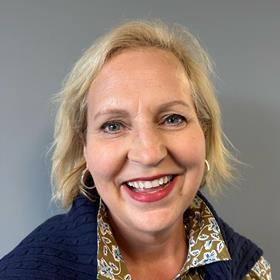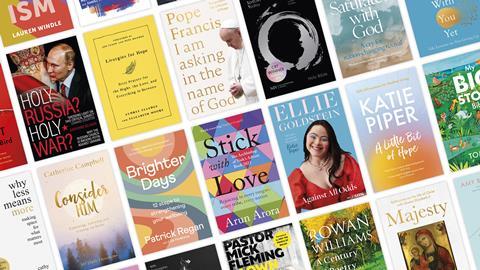Wendy Grisham, deputy CEO of SPCK Publishing (and sister to author John Grisham), gives us insight into her progressive, radically inclusive faith, which fuels her passion for non-fiction books that bridge gaps and widen our conversations to reflect the expansiveness of God
“I love to talk about books,” Wendy shares. “But I’d much rather do it with a shovel in my hand!” Wendy Grisham loves books that kick up the dirt; books that stir us up and challenge us, uncovering the depth and breadth of our human existence. Books that individually, or collectively, reflect the spaciousness of God.
Wendy is committed to promoting books that cover the length and breadth of the Church, and beyond – whether it’s conversative, evangelical, charismatic, radical left-wing or even secular, you’ll find it all at SPCK. “To me,” she says, “that is the beauty of it. We need all these voices to be heard.”
For Wendy, it’s a precursor to heaven: “I imagine us spending eternity in these sorts of conversations – ones that really pull everything out and make us examine our perspectives from all angles – but in a way that is beautiful and respectful. I certainly hope we’re not all going to be thinking the same thing in heaven. Goodness gracious, how boring would that be!”
Faith beyond church
Wendy describes her faith as “expansive” and “radically inclusive” of a range of theologies as well as different backgrounds, perspectives and worldviews. She’s excited by bookshelves where Phyllis Tickle and Richard Rohr can sit spine to spine with Tim Keller or Joyce Meyer; bookshelves where different expressions of faith exist comfortably alongside one another, celebrating the expansiveness of God.
Such a bookshelf would not have been found in her Southern Baptist childhood home. Wendy was presented with a very specific conservative evangelical theology when she was growing up, one that later felt incongruent with her lived experience. For 18 years, whenever the church doors were open – Sunday morning, Sunday night, Tuesday night visitation, Wednesday night prayer meetings – Wendy was there, alongside her parents and siblings. But when she left home for university in the UK, she channelled her inner rebel and only went to church sporadically, eventually stopping altogether in her 20s.
The next decade spent away from the Church was significant for Wendy, enabling her to explore outside the boundaries of her inherited faith. “Because I was no longer involved in the Church in the same way, it gave me the option of expanding outside of my comfort zone, as it were.” Wendy found herself naturally embracing relationships with people of other faiths, intrigued by their worldviews and wanting to learn from them, rather than proselytise. “My world just got a whole lot bigger.”
Despite the liberating, expanding worldview Wendy experienced while distant from the Church, she still felt an innate need to explore her ever-widening faith in the context of Christian community, returning to church in 2002. She experienced a homecoming at Holy Trinity Brompton, re-embracing her faith in a new way, distinct from the theology and practices she grew up with; a faith rooted, yet flexible enough to ride life’s waves.
Cancer and inclusivity
In 2010 while working for Hodder Faith – where she published international bestseller The Shack – Wendy was diagnosed with breast cancer. “It is one of the best things that ever happened to me,” she declares, unexpectedly.
Her diagnosis ushered in a season of waiting and leaning into God; putting into practise the profound truths about attentive, active waiting that Bob Sorge uncovers in his book Secrets of the Secret Place (Oasis House); going slow enough to appreciate her needs and value her body. “There is something about sitting in that space and owning your physical self, and knowing God has given it to you as a gift, as a responsibility to look after.”
When Wendy’s mum had received a cancer diagnosis three years before, Wendy had faced the disorientation of unanswered prayer, leaning into books like Pete Greig’s God on Mute (Kingsway Publications), feeling lifted by his raw, real account of God’s loving, yet often baffling, interactions with us. But with her own diagnosis, instead of feeling God’s absence, Wendy experienced a painful but profound re-connection with herself, God and others. Despite being a lover of words, she discovered the most powerful prayers were when nothing was said – wordless, guttural cries for God to draw close.
“I lost all my hair, my eyebrows, my eyelashes and my fingernails as part of the side effects of chemotherapy. Everything that made me feel like a woman. And it was like I was taken all the way back down to the bare bones and rebuilt. It felt like I lost everything that made me the person God created me to be. And in that moment I thought: ‘Ah, there are people who feel like this every day. Have I always been fair to them?’”
Wendy’s experience of cancer instilled in her a deeper, fiercely protective compassion for anyone made to feel ‘other’ – due to background, worldview, sexuality, race or life-experience – and alongside her compassion, a discovery of: “the real Jesus; a radically inclusive Jesus. Sat at a table big enough for everybody, whether they look like me or not, and whether they think the same way I do or not.”
There was no going back for Wendy; every person, every theology, is now at the table. “I’ve learned from [those at the table] and how they’ve embraced faith, how they’ve been embraced and also how they’ve been rejected.”
Conversations with radicals
For Wendy, books have always been the way to bring more chairs to the table. It is her ministry; a way to open up the conversation. In 2011, while living in Tennessee, with a fresh, radical faith following her first journey with cancer, Wendy started Jericho Books, committing to publishing progressive voices. Her first book was Brian McLaren’s Why did Jesus, Moses, the Buddha and Mohammed cross the road? The answer: to get to the other, to learn from each other, to establish a benevolent, inclusive Christian identity.
Wendy was able to have conversations with other radical thought leaders – Matthew Paul Taylor and Rachel Held Evans, among others – and sit at the feet of her favourite author, Phyllis Tickle. “And as I did that, my faith became even more wide and big, and wild. I was just trying to keep up with it! It was beautiful. It’s probably one of the most romantic times in my entire life with Jesus, because I was just seeing everything through completely different eyes.”
Beyond traditional moulds
Wendy moved back to the UK and worked for Spring Harvest for a few years, but she always knew her heart lay with books. “I stepped away from it and couldn’t let it go. It was always pulling at me.” She knew God was gently, persistently calling her back, she just needed to wait for his timing. And then one day, an email appeared in her inbox. She knew when she opened it that it would change her life. It was the SPCK job, seemingly tailor-made for her; a God-given opportunity to platform a diverse range of voices.
Breast cancer is one of the best things that ever happened to me
“I’m not interested in publishing books that are going to sit in a Christian bookshop and only be read by Christians. I want to publish books that are going to end up in mind, body, spirit and self-help and fiction and travel and hospitality and history.”
Wendy is committed to bridging the Christian literary world with the secular, knowing that God’s voice permeates it all and should be heard echoing through all genres. She sees God doing this through raising up voices that don’t fit the traditional moulds; voices from the LGBTQIA+ community, voices from the Global South, where the Church is growing exponentially, and powerful female voices.
“Those are the beautiful stories to write. They don’t look traditional, but they are so needed, and they will transform us.”

Follow on Instagram: @wgrish
Words by Jane Knoop



























No comments yet